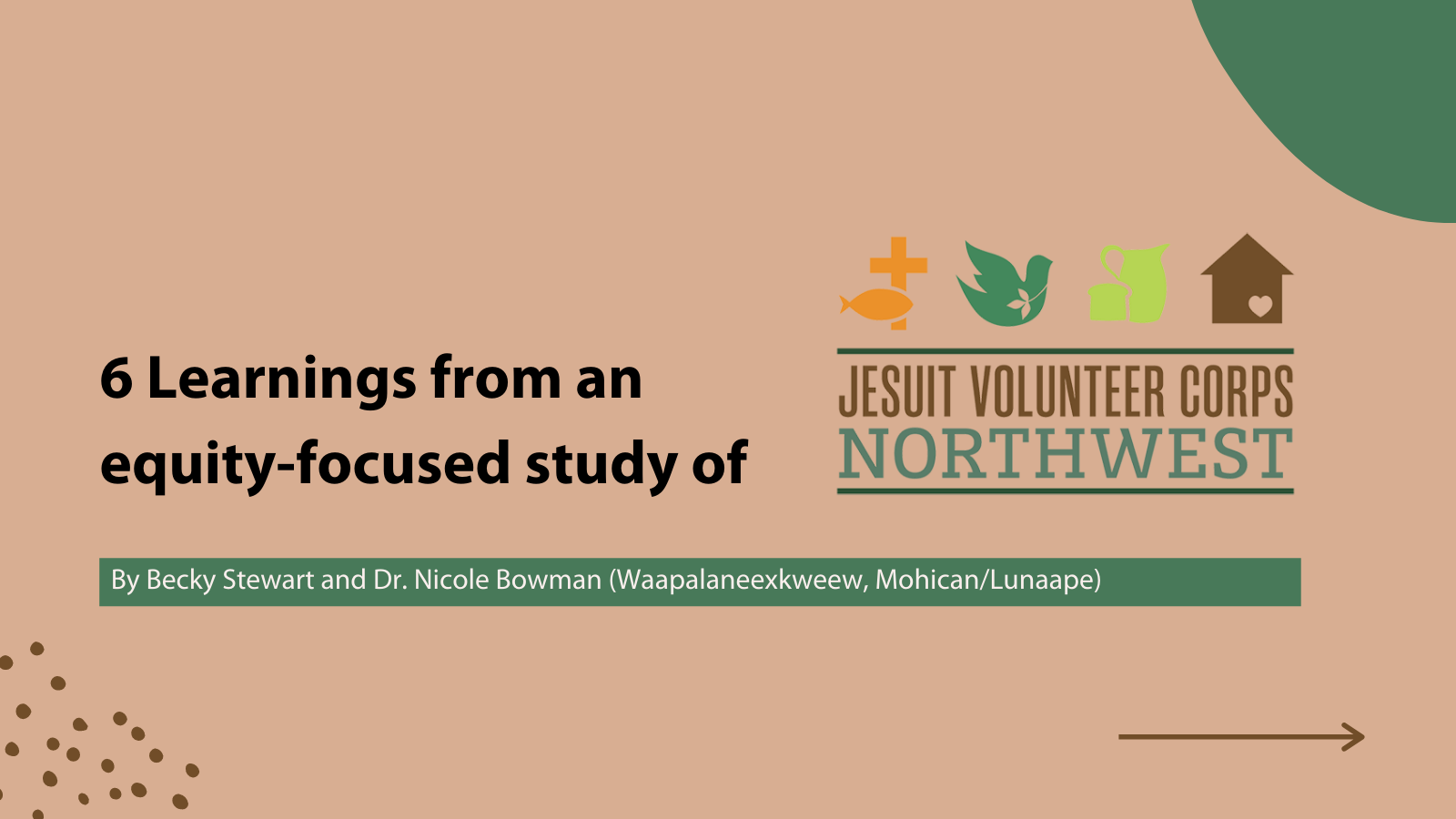
Hi! I’m Becky Stewart, Chief Practice Officer at The Improve Group. It was our joy to collaborate recently with Dr. Nicky Bowman (Waapalaneexkweew, Lunaape/Mohican), President and Founder of Bowman Performance Consulting, on an equity-focused assessment of Jesuit Volunteer Corps Northwest’s service model. JVC Northwest recruits, places, and supports volunteers who provide service grounded in the Jesuit Catholic tradition to respond to local needs in communities across the Northwest.
JVC Northwest partnered with our teams to engage partners and community members to understand how volunteers impact local communities, particularly Native communities and communities of color, and what types of partnerships and program structure would foster healing from trauma and progress toward racial equity. We knew Dr. Bowman would be the right partner for this work because of her deep expertise and experience with equity-focused evaluation, as well as engagement and evaluation with Native communities.
We document insights from every project to inform and strengthen our work. Here are some tips that Dr. Bowman and IG are taking away from this study for future equity-focused work:
1. Prioritize building authentic partnerships.
Invest resources (e.g., time, emotions, intellect, listening, funding, shared power, etc.) to create authentic and reciprocal relationships. This builds trust and lasting partnerships. It also brings value and shared responsibility for equity work.
2. Build on strengths—and build capacity—over the course of the work.
Advance areas of strength while building capacities along the way as the work is designed and implemented. Challenges and gaps are just opportunities for learning, unlearning, and relearning together. Equity work is a process that begins internally. If done properly, it can spread from a person to the contexts of influence a person has with the right leadership, resources, and human development strategies.
3. Listen and be responsive to ensure engagement is relevant for stakeholders.
Stakeholder engagement requires listening and being responsive so diverse activities for relevant participation can be co-created across various levels and types of partnerships. Relevancy is based on the role and function of the communities, organizations, and individuals you are engaged with. Meet people right where they’re at and support their transformation and progress incrementally rather than being a perfectionist. Celebrate little successes—and the big ones, too!
4. Provide authentic opportunities for clients and stakeholders to share their expertise through engagement that is sustainable and respects the many priorities in their lives.
Stakeholder expertise should be at the center of every evaluation, and opportunities to share this valuable knowledge should be authentic and accessible. However, evaluators should be thoughtful about the burden of informing an evaluation for clients and stakeholders. It can help for evaluators to draw on their experience to transparently provide ideas—on anything from data collection methods, to outreach, to analysis—as a humble starting point and invitation for others to react to and shape them. In the end, this can help infuse client and stakeholder expertise into a project with transparent sharing of ideas and plans, inviting feedback and advice in plain language and accessible ways.
5. Be clear about the limitations of what the evaluation can speak to.
It is important to be transparent about the limitations of what a study can speak to because there are often many layers to building a full picture for equity-focused work. If the project circumstances don’t allow for comprehensive work, be clear about what the study does—and doesn’t—cover. In this case, the project focused engagement solely on gathering external perspectives about the service model—meaning we could only provide one piece of the picture. We had to be clear, for example, that we couldn’t make connections between internal practices or policies and external experiences because of the limits on the data we gathered.
6. Offer a variety of ways for stakeholders to participate to support authentic engagement.
We were so grateful for the thoughtful insights stakeholders provided during very challenging times, including the pandemic and historic wildfires. This engagement was key to helping us design the project, identify additional community stakeholders to interview, and make meaning of the results. To support this level of engagement, we offered a variety of ways for people to be involved. For example, a small work group did a deeper review of the findings, while all the partner sites had the opportunity to quickly provide high-level feedback through an online platform when it was convenient for them.
Thank you to the project participants and JVC Northwest for teaching us so much through this work! You can view the full Service Model Evaluation report here.
